The new set will arrive soon in both digital and physical formats, so it's good to get familiarized with some details - which can give you that differential in an event/tournament!
Flashback

This is an old mechanic, closely associated with Innistrad (because of the themes surrounding the use of the graveyard in all past sets of this plane), although it originally appeared in the Odyssey block back in October 2001.
Basically, it's an ability that grants an alternate cost to instants and sorceries to be cast from the graveyard (the Flashback cost can only be used if the card is in the graveyard, and it doesn't work in any other zone in the game).
Even though it's an alternate cost, effects that modify this cost will happen normally — for example, the Diregraf Rebirth's ability will also reduce the amount of mana to be paid to Flashback, or an effect like Thalia, Guardian of Thraben's will increase this amount of mana.
Disturb

One of the new mechanics of Midnight Hunt, Disturb can almost be summed up as a "Flashback, but on creatures". The “almost”, however, is precisely because when you cast the creature with Disturb from the Graveyard, the OTHER side of it goes to the stack.
That is, if the Galedrifter is in your graveyard, and you can cast a creature, you can pay the Disrupt cost of 4U and cast its OTHER side, Waildrifter.
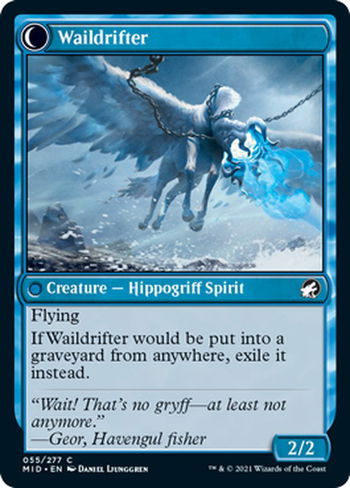
Just like Flashback, the card you cast through Disturb goes on the stack normally, and can be answered, countered, etc. Also like Flashback, if the creature was going to be put into a graveyard, you exile it instead.
One important rule detail that many people get wrong when dealing with Flashback, so the same is likely to happen with Disturb, is that by paying the cost, whoever is casting the spell has already removed it from the graveyard and put it on the stack. That is, effects that exile cards from the graveyard cannot affect something that is no longer there. So, if you want to exile something from your opponent's graveyard to prevent Flashback/Disturb, you need to do so BEFORE your opponent has priority - otherwise, if your opponent has a chance to pay the cost and cast the spell, it's too late to affect it on the graveyard.
Coven

Coven is yet another new abilty in Midnight Hunt, which calls for a “check” of a certain condition for an effect to happen. In this case, the condition for “Coven” is that the controller has at least three creatures with different powers.
That is, a card like the Ritual of Hope will normally grant +1/+1 to your creatures. However, if the Coven's condition is met, your creatures get +2/+1 instead. It's a seemingly simple ability, though the bonuses granted can even turn a game that seems lost. So, remember to pay attention to the power of your opponent's creature!
Daybound // Nightbound
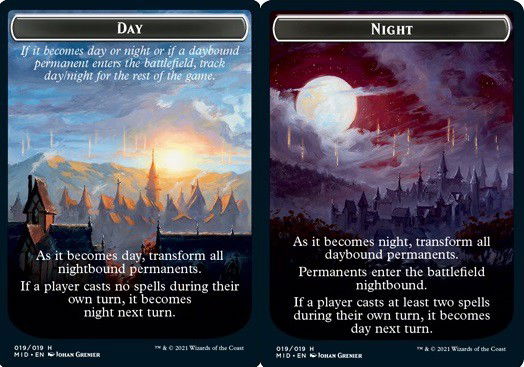
Being a set focused on werewolves, there was no lack of mechanics that dealt with these monsters' nature. In previous sets, the transform mechanics handled it a little differently, so if you've come across these sets, be cautious not to get confused — the Midnight Hunt's Day/Night mechanic has some VERY IMPORTANT differences!
Basically, a “state” is created in the game's rule that indicates it is “Day” or “Night” during the turns — until the condition that makes the day turn into night is fulfilled, or vice versa.

Every Magic game, when it starts, does NOT have this status. It will depend on whether some card appears that changes that — for example, a card with the ability "Day", which will then bring "Day" to the battlefield.
To turn "Day" into "Night" at the start of each turn, if the active player didn't cast any spells in the previous turn, it will then change to "Night". If at the start of the next turn, the active player from the previous turn has cast two or more spells, “Night” will then turn to “Day”.
Does it look confusing? Let's think about it like this: who “controls” the Day/Night change is the “owner” of the previous turn. If you didn't cast any spells, then it's guaranteed that when you pass the turn, it will be “Night”. If you cast two or more spells, then it's “Day”.
How about an example of this ability in “action” for us to understand better?
Let's say you're playing an aggressive Werewolves deck, and you've started the game. On your turn 2, you cast an Outlander Liberator:

As she has Daybound, and in this game she didn't have any status yet, so now it becomes “Day”. You pass the turn.
Your opponent, with a slower deck, just plays a tapped land and passes the turn back, not having cast any spells. That is... when your turn starts, as the active player from the previous turn (your opponent) has not cast anything, so the "Day" became "Night"... and with that turned your Outland Liberator into a Frenzied Trapbreaker!
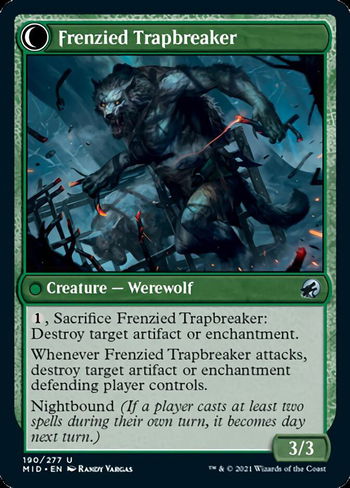
And it's not over yet! You played a land and cast a Reckless Stormseeker!

But since it is night, it enters the battlefield with its Nightbound side!
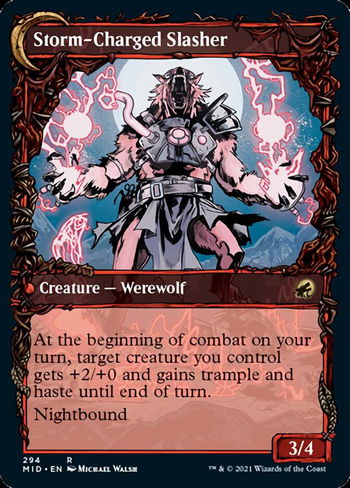
With that, you control both Frenzied Trapbreaker and Storm-Charged Slasher. At the start of combat, you grant +2/+0, trample and haste to the Slasher, and go all out with your werewolves for 8 damage. Poor opponent! You pass your turn — since you cast only one spell (not two), It will continue as Night on your opponent's turn!
Conclusion
And with that, we come to the end of today's article!
I hope I managed to explain how the mechanics work, and that this will help you in your next matches with the new set!
If you still have any questions, you can leave a comment here in the article that I'll be happy to answer.

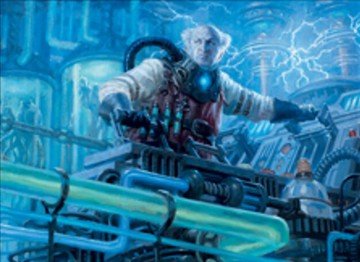







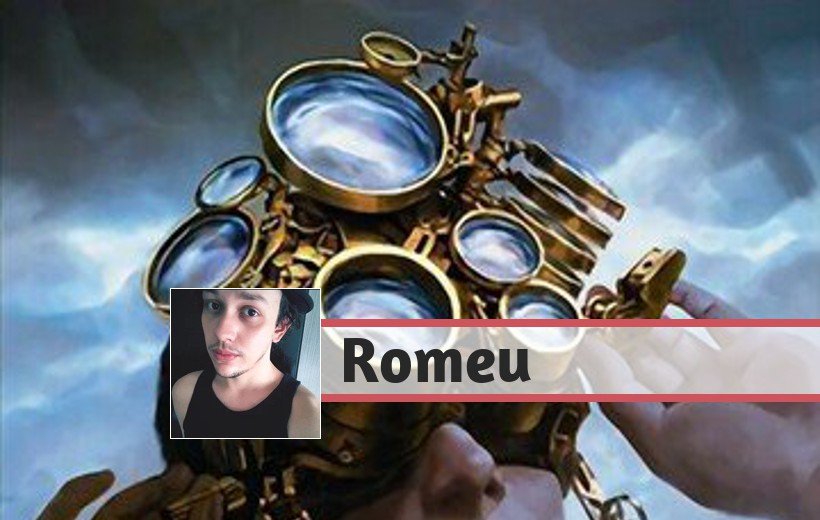
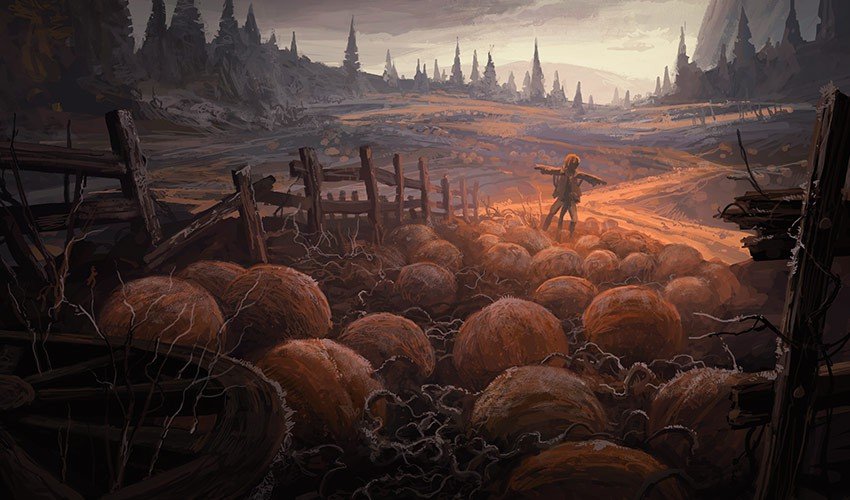



— Comments 0
, Reactions 1
Be the first to comment